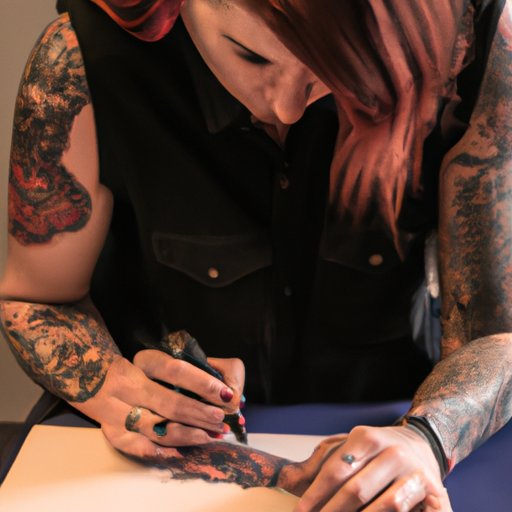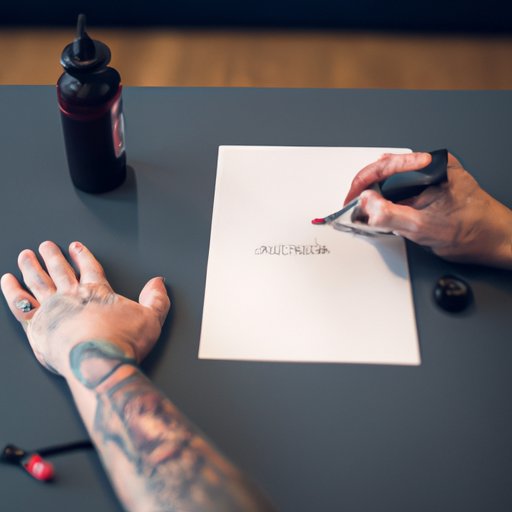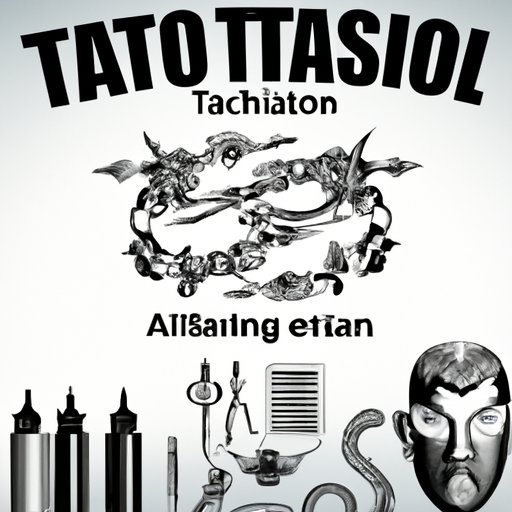Introduction
Tattooing has become increasingly popular over the last few decades, with more and more people getting tattoos as a form of self-expression and body art. As a result, the demand for skilled tattoo artists has grown significantly. But what does it take to become a tattoo artist?
A tattoo artist is someone who creates permanent designs on the skin using needles and ink. They must have a strong artistic ability and technical skills, as well as be knowledgeable about sterilization techniques, safety protocols, and legal and regulatory requirements. Becoming a successful tattoo artist requires dedication, hard work, and a commitment to learning and honing one’s craft.

Exploring the Essential Qualifications and Training Required to Become a Tattoo Artist
To become a tattoo artist, there are certain qualifications and training that are necessary.
Artistic Ability
The most important qualification for a tattoo artist is having a strong artistic ability. Tattoo artists must have an eye for detail and be able to create designs that are both aesthetically pleasing and technically accurate. Having a strong foundation in drawing and painting is essential, as is being familiar with different styles of art and tattooing.
Technical Skills
In addition to having a strong artistic ability, tattoo artists must also possess certain technical skills. This includes understanding how to use and maintain tattoo machines, needles, and other equipment. Tattoo artists must also be knowledgeable about the various types of inks and the best methods for mixing colors.
Professional Licensing Requirements
Most states require tattoo artists to obtain a professional license before they can legally practice. Requirements vary by state, but typically involve completing an approved training program, passing a background check, and obtaining liability insurance. It is also important for aspiring tattoo artists to stay up-to-date on any changes in their state’s licensing regulations.
Apprenticeships
Another way to gain experience and learn the necessary skills to become a tattoo artist is through an apprenticeship. Apprenticeships involve working with an experienced tattoo artist to learn the trade. Apprenticeships can last anywhere from several months to several years depending on the individual and the shop.

Breaking Down the Steps to Becoming a Professional Tattoo Artist
Once you have the necessary qualifications and training, there are several steps you need to take in order to become a professional tattoo artist.
Gaining Experience
The first step to becoming a professional tattoo artist is gaining experience. This can be done through apprenticeships or practicing on friends or family members. It is also important to get feedback from experienced tattoo artists in order to hone one’s skills and develop an individual style.
Obtaining Licenses and Certifications
The next step is to obtain the necessary licenses and certifications required by your state. As mentioned earlier, this typically involves completing an approved training program, passing a background check, and obtaining liability insurance.
Building a Portfolio
Aspiring tattoo artists should also start building a portfolio of their work. This will help them showcase their skills and demonstrate their artistic abilities to potential clients.
Establishing a Professional Network
Finally, it is important for aspiring tattoo artists to establish a professional network. This can include joining professional organizations, attending conventions, and connecting with other tattoo artists. These connections can be invaluable when it comes to finding clients and staying up-to-date on the latest trends and techniques.
What You Need to Know Before Pursuing a Career as a Tattoo Artist
Before pursuing a career as a tattoo artist, there are a few things to consider.
Consider Your Motivations
First and foremost, it is important to consider why you want to become a tattoo artist. Are you passionate about creating art? Are you looking for a creative outlet? It is important to make sure that your motivations are rooted in a genuine interest in tattooing and not simply for the money.
Research Different Styles of Tattoos
It is also important to research different styles of tattoos in order to find the one that best suits your interests and abilities. There are numerous styles of tattooing, ranging from traditional to black and grey to neo-traditional. Researching each style will help you determine which one is the best fit for you.
Understand the Legal and Regulatory Requirements
Finally, it is important to understand the legal and regulatory requirements for tattooing in your state. This includes knowing the laws about age restrictions, health and safety regulations, and licensing requirements. It is also important to keep up-to-date on any changes to these regulations.
The Necessary Tools and Supplies for a Successful Tattoo Artist
In addition to having the necessary qualifications and training, there are certain tools and supplies that are essential for a successful tattoo artist.
Power Supply
The power supply is the most important piece of equipment in a tattoo artist’s arsenal. The power supply is used to regulate the voltage and current of the tattoo machine, allowing the artist to control the intensity of the needle.
Autoclave
An autoclave is a device used to sterilize tattoo equipment. It is essential for ensuring the safety of both the client and the artist.
Tattoo Machines
Tattoo machines are used to create the tattoos. They come in a variety of sizes and styles, and it is important for tattoo artists to choose the right machine for the job.
Tattoo Inks
Tattoo inks are used to create the design. There are many different types of inks available, and it is important for tattoo artists to know the differences between them.
Needles and Needle Cartridges
Needles and needle cartridges are used to puncture the skin and inject the ink. It is important for tattoo artists to understand the different types of needles and how to properly insert and remove them.
Aftercare Products
Aftercare products are used to help the tattoo heal and prevent infection. These products include lotions, ointments, and soaps.
Disposable Supplies
Disposable supplies such as gloves, masks, and aprons are essential for maintaining a sterile environment. It is important for tattoo artists to use these supplies correctly and discard them after each use.

Tips for Choosing the Right Tattoo Artist for Your Needs
Choosing the right tattoo artist for your needs is an important decision. Here are some tips to help you make the right choice.
Ask Questions
When considering a tattoo artist, it is important to ask questions. Make sure to inquire about their experience, their style, their approach to safety and sanitation, and any other questions you may have.
Read Reviews
Reading reviews from past clients can be a great way to get insight into a tattoo artist’s work and professionalism.
Look at Their Portfolio
Looking at a tattoo artist’s portfolio is a great way to get an idea of their style and skill level.
Get Referrals
Getting referrals from friends or family who have had tattoos done can be a great way to find a reliable and reputable tattoo artist.
Conclusion
Becoming a successful tattoo artist requires dedication, hard work, and a commitment to learning and honing one’s craft. Aspiring tattoo artists must possess certain qualifications and training, including a strong artistic ability, technical skills, and knowledge of legal and regulatory requirements. Additionally, aspiring tattoo artists must take certain steps to become a professional, such as gaining experience, obtaining licenses and certifications, building a portfolio, and establishing a professional network. It is also important to consider one’s motivations, research different styles of tattoos, and understand the legal and regulatory requirements. Finally, there are certain tools and supplies that are essential for a successful tattoo artist, and it is important to follow certain tips when choosing the right tattoo artist for your needs.
(Note: Is this article not meeting your expectations? Do you have knowledge or insights to share? Unlock new opportunities and expand your reach by joining our authors team. Click Registration to join us and share your expertise with our readers.)
